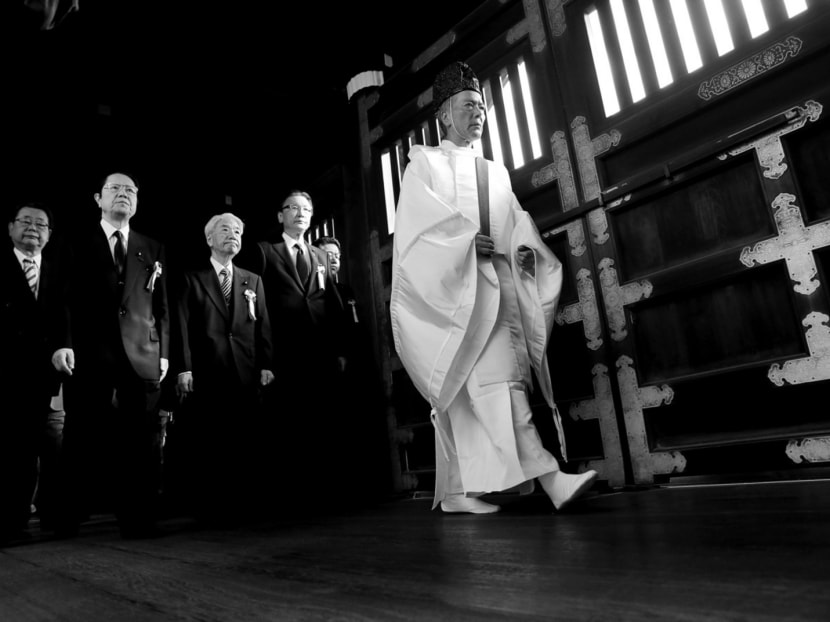In search of an East Asian geopolitical miracle
East Asia has amazed the world with its economic miracles. But the region must now overcome its geopolitical challenges. In the wake of World War II, Japan was widely assumed to be “finished”, South Korea was a basket case of underdevelopment, and China was chaotic and poor — indeed, the terms “Chinese” and “poor” were held to be synonymous.

Japanese lawmakers being led by a Shinto priest to pay their respects to Japan’s war dead in the Yasukuni Shrine in Tokyo last year. Whereas Germany
has been a major source of reconciliation and stability in Europe, Japan — through its uncontrite behaviour— is a source of friction in East Asia. Photo: Reuters
East Asia has amazed the world with its economic miracles. But the region must now overcome its geopolitical challenges. In the wake of World War II, Japan was widely assumed to be “finished”, South Korea was a basket case of underdevelopment, and China was chaotic and poor — indeed, the terms “Chinese” and “poor” were held to be synonymous.
Taiwan was hardly worth consideration economically notwithstanding its importance geopolitically.
When I first visited Taipei half a century ago, its main economic activity seemed to be as a base for United States soldiers on rest and recreation from the Vietnam War. As for South-east Asia, it was mired in poverty, instability and conflict.
Reflecting the perception of backwardness accompanied by a degree of condescending hopelessness, the Swedish Nobel economics laureate Gunnar Myrdal published in 1968 a three-volume magnum opus entitled Asian Drama: An Inquiry Into the Poverty of Nations. In 1993, 25 years later, the World Bank published its report entitled The East Asian Miracle.
Apart from confirming the fact that, yes, economists believe in miracles, the term has been quite widely used in describing economic developments in East Asia.
The first use of the term “economic miracle” (to my knowledge) was applied to Japan in the 1960s. Contrary to expectations, the phoenix did rise from the ashes: In 1964 Tokyo held the Olympic Games; in 1965 it joined the OECD; in 1967 it surpassed West Germany in GDP, and from then on, went about conquering international markets.
Following Japan’s rise, there were the four “tigers” — Taiwan, Hong Kong, Singapore and South Korea — which rank among the few economies worldwide that succeeded in rising from Third World status and overcoming the middle-income trap. Over the course of the late 1970s and 1980s, South-east Asia transformed from a battlefield to a marketplace, with the notably high growth rates of Thailand, Malaysia, Vietnam and Indonesia. And then came the most awesome miracle of all — China.
These East Asian economic miracles had significant positive social consequences: Tremendous reduction of poverty, rise of a robust urban middle class, increased life expectancy, improvements in education, cultural achievements (for example, in music) and increased leisure activities such as foreign travel. There are, however, a number of egregious qualifications to this. While the region’s economic edifice remains impressive, its institutional, historical and geopolitical foundations are alarmingly weak.
The contrast between the post-war settlement in Europe and in East Asia illustrates the East Asian situation. One begins with the starkest contrast of all — in post-war Germany’s attitude towards its neighbours and that of Japan. One cannot imagine a senior German politician paying respects at a memorial dedicated to former Nazi leaders, as Japanese political leaders repeatedly do with respect to war criminals at the Yasukuni Shrine — most recently the Minister of Defence Tomomi Inada.
One cannot imagine the mayor of Berlin publicly denying the existence of the Dachau concentration camp, as the former long-serving governor of Tokyo, Mr Shintaro Ishihara, publicly and repeatedly denied the occurrence of the Nanjing massacre. One cannot imagine a German chain hotel proprietor installing in every room a book praising Germany’s past military prowess, as Mr Toshio Motoya has done in his chain of APA hotels with a book he authored praising Japan’s past imperialist militarism.
Whereas Germany has been a major source of peace, reconciliation and stability in Europe, Japan — through its hubristically uncontrite behaviour— is a source of friction, suspicion and instability in East Asia. This is especially critical in a region that is the world’s most geopolitically explosive.
A number of situations in East Asian could foreseeably degenerate into World War III. Offensive military action in the Korean peninsula, US intervention in the conflict between Japan and China over the Senkaku/Diaoyu islands in the East China Sea, or US Secretary of State Rex Tillerson’s threatened blockade on the South China Sea could all be triggers.
These are the biggest flashpoints in the region, but there are others. Every East Asian state has tense relations with one or more of its neighbours. As the Association of South-east Asian Nations (Asean) celebrates its 50th anniversary this year, it can be commended for its significant achievements in neighbourly confidence-building. Yet, even the most ardent Asean fan would admit there are fragilities.
Since the end of the Vietnam War, the US’ impact in East Asia has been on balance benign. This is partly due to the economic dynamism of the region and its integration with global markets — especially the US market. It is also because the US has been militarily bogged down in the Middle East following its interventionism and thus limited in its ability to do harm in East Asia.
Not just China but the whole region can be construed as the proverbial “china shop” into which the US presidential election has unleashed a bull. Great delicacy and diplomatic sophistication are required. Following East Asia’s economic miracles, what is urgently required in the Trumpian era is a geopolitical miracle. EAST ASIA FORUM
ABOUT THE AUTHOR:
Jean-Pierre Lehmann is Emeritus Professor of International Political Economy at IMD, Switzerland, founder of the Evian Group, and Visiting Professor at Hong Kong University.






